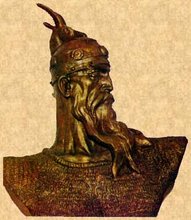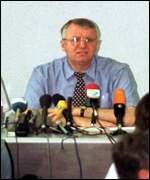***************************************
Author: Ivan Colovic
Uploaded: Friday, 14 March, 2008
Devastating review, by one of Serbia's most distinguished cultural critics, of a heavyweight book on Kosovo just published in Belgrade which laments the historic failure by Serbia, after it annexed the territory in 1912, to adopt a 'final solution' to the problem of its Albanian population
I too agree that the main question is: ‘Why did Serbia lose Kosovo?’ In other words: ‘Why has it been the case for a few days now that this territory remains in Serbia only "forever", rather than in other ways too?’ We have heard, and continue to hear, what politicians, analysts, priests and football fans think about this. Patriotic writers and other artists, sensing probably which way things were going, had made their views on the causes of the loss clear even earlier. We see that collective prayers, political declarations and speeches, slogans on banners and the stones wielded by alleged football fans, largely agree that Kosovo has been granted independence - or as is commonly said ‘stolen’ from Serbia - only because this corresponds to the interests of the United States and other Western powers. And, as always, might is right!
But what do our scholars say about it? Have they a different or at least a more convincing reply to the question of how it happened that Serbia lost Kosovo? Where, if not in scholarly works, should we seek to find sober - or as people say these days tenable - thinking about Kosovo, or for that matter about any important social and political subject? Luckily for us Serbian scholars are hard at work, they are studying Kosovo too, and sometimes they even publish the results of their scholarly endeavours. An extensive scientific study has indeed just been published in Belgrade, not a moment too soon, with the title: Kosovo and Metohija; and this, according to the introduction, should ‘help us to find our way in the chaos of the highly complex and fateful problems of Kosovo and Metohija, and steer us towards practical solutions’. Wonderful! This is what we have been waiting for; this is what we need: new ideas, a new orientation, scientifically based solutions for overcoming chaos.
The scholarly quality of the book Kosovo and Metohija is at first glance quite unexceptionable. The author, Dr Milovan Radovanović, is a noted geographer, an emeritus professor of Belgrade University, former director of the Geographical Institute of the Faculty of Science and Mathematics in Belgrade, former director of the Geographical Institute of the Serbian Academy of Arts and Science, professor at the University of Banja Luka, bearer of the ‘Jovan Cvijić’ medal, honorary member of the Geographical Society of Macedonia, associate of the Serbian-American Centre and of the State Negotiating Team for Kosovo and Metohija.
The book was published by ‘Službeni glasnik’, a leading Serbian publisher, on the basis of a recommendation from two academicians, Vladimir Stojančević and Miloš Macura, with an introduction by Dr Mirko Grčić, professor at the Faculty of Geography in Belgrade, and a brief authorial biography by Dr Milan Bursać, professor of the Faculty of Science and Mathematics at the University of Kosovska Mitrovica. The book contains appendices with extracts from the recommendations, a bibliography of the author’s works, three tables and a dozen maps. This adds up to over 600 large-format pages. Impressive indeed!
The reader will be additionally impressed by the large number of fields that the book covers. Its very subtitle evokes the breadth of the author’s scientific approach to Kosovo: ‘Anthropo-geographical, historico-geographical, demographic and geo-political foundations’. In fact, however, having read the contents and leafed more carefully through the book, the reader will discover that the subtitle might have been considerably longer, and that Dr Radovanović has modestly listed only four scientific disciplines among the far greater number of disciplines, sub-disciplines and scientific research areas whose results and methods he has used in his work on Kosovo. These are listed as follows: geo-strategy, geo-economy, geo-demography, political geography, cultural geography, ethnography, ethno-demography, ethnonymy, ethno-statistics, ethno-psychology, ethno-cartography, onomatology, anthroponomy, demo-politics, historical demography, political history, sociology, etymology, characterology, biometry, eugenics, cultural history, economy... - it is probable that other disciplines or sciences are included which I have missed on a first reading of the book.
Well, then, what conclusion does Dr Radovanović reach on the basis of this rarely seen concentration of multifarious scientific knowledge about the causes of Serbia’s loss of Kosovo? Why the loss, how did it happen? Briefly, Kosovo was lost - this interdisciplinary study reveals - because the Serbians, who in 1912 occupied the territory, allowed the Albanians to remain there instead of removing them altogether, i.e. implementing the so-called ’final solution of the Albanian question’.
This conclusion of Dr Radovanović’s magisterial study may appear at first glance too modest, disproportionate in relation to the grandiose scientific apparatus used to deduce it, and also unoriginal. For, indeed, neither the idea contained in the conclusion nor the term ‘the final solution’ are new. The author himself does not deny this, because for him, undoubtedly, scientific truth is far more important than who may have discovered or formulated it. He does not hide, for example, that he took the idea of the fatefully lost opportunity on the part of the Serbs to get rid of the Kosovo Albanians finally and permanently from Vaso Čubrilović: that -according to Dr Radovanović - ‘superb historian... experienced revolutionary and zealous worker in the field of the revival of brutally crushed Serbdom’. He quotes with approval parts of what we would today call his cult text from 1937, in which Čubrilović accused the government of the day for not having seized the land in good time from the Kosovo Albanians and deported them to Albania, instead conducting a policy towards them based on European civilisational standards, or as Čubrilović said: ‘letting the Albanians become accustomed to Western European notions of private ownership in land’. The Albanians’ primitive civilisation had taught them that everything belongs to the conqueror; but the civilised Serbs, when establishing their government in 1912, had left the Albanians with both life and property, to their great astonishment. So who are we to blame?
In Dr Radovanović’s view, Čubrilović’s analysis remains relevant to this day and provides a valuable guiding idea. ‘His logic, his autopsy, his judgement, the significance and order of the facts he examines, are accurate and confirmed by the evolution of events up to the present day, to such an extent’, he writes, ‘that they represent an exact deterministic (functional) system to which one cannot add or subtract anything, except a demo-statistical component’. The great modesty of the author should not lead us, however, to overlook his own personal contribution to the elaboration and affirmation of ideas about the solution of the Albanian question on sound national foundations, in other words its final solution. Vasa Čubrilović had it easy at the end of the 1930s, when ideas about final solutions to conflicts between races and peoples enjoyed scientific and political prestige among a goodly proportion of European scientific and political thinkers. Today, in the post-Auschwitz world, when it is believed - probably for unscientific reasons - that the price of final solutions is unacceptably high, scientists and patriots who advocate them require very much greater courage. It is fortunate, however, that Dr Radovanović can count on the support of part of our public, and - which is particularly encouraging - on those young people who are ever more openly advocating a revision of humanistic and democratic dogmas - those American fabrications - including the mantra about the equality of all peoples and the universality of human rights: those young people who openly give themselves the beautiful names of Nazis and racists, white power and racial pride. They - or at least the more literate among them - will be delighted to see the author speak of what he calls ‘the renewal of Serbdom in the cradle of Serb statehood and culture’ and refer to a ‘blood’ renewal of Serbdom that differs in kind from ‘demographic’ renewal. For, as the racially and nationally conscious youth will quickly grasp, it is one thing to have a large enough people, quite another for them to have pure blood in their veins.
The importance of this magisterial study perhaps lies not in its coming up with new ideas, but in its restoring the reputation, undermined for unscientific reasons, of good old ideas about races and nations, and their merciless struggle for living space. Sticking bravely to objective scientific methods, refusing to yield to common sense or irrelevant moral considerations, unaffected by political correctness, Dr Radovanović brings us face to face in his study with the essence of the matter: with the naked truth about the eternal struggle of the nation for its living space. It says: Us or Them, and better Us than Them. If it happens, however, that the final solution is applied too late - as happened, to the author’s great sorrow, in Kosovo - then the only thing that remains is an extorted and provisional solution in the form of a division of territory. We are dealing, Dr Radovanović explains, with an ‘acute confrontation between two civilisationally, sociologically, demographically and developmentally incompatible social and national formations in the same space. This is why territorial separation is the only rational solution.’
The reference to ‘incompatible formations’ may appear to some as a reference to Huntington’s celebrated book on the clash of civilisations. Huntington does indeed believe that civilisations clash because they are different; but he does not speak about hierarchical differences between them. Dr Radovanović has in mind precisely such differences between them as are neglected these days for unscientific reasons. The division of Kosovo that he advocates is, in fact, a division between its barbarian and its civilised parts. The motto he chose for one of the book’s chapters reads: ‘Barbarians too, if they increase their numbers sufficiently, may overcome their culturally superior competitors by mass immigration, and appropriate or destroy all their national achievements.’ This is a sentence from a lecture given by a professor of medicine, Milan Jovanović Batut, in 1900. Batut did not mention Kosovo in his lecture, but Dr Radovanović is convinced that his thoughts about barbarians and culturally advanced people refers precisely to the Albanians and the Serbs, or, as he writes, to: ‘the expansion by immigration of a civilisationally inferior population which by violence and numerical superiority ... destroys the original inhabitants and their successors’. And since civilisation has failed to repulse the barbarian invasion over the whole territory of Kosovo, let us help it to withdraw to one corner of the latter, in the hope that it may be able to survive at least there. The whole of the civilised world is bound to see this as being in its own interest too, and the credit for this understanding and solidarity will certainly go to such scientific works as Dr Milovan Radovanović’s Kosovo and Metohija.
Translated from Belgrade Radio B92's Peščanik [Hourglass] programme, 13 March 2008





















4 comments:
For our "linguistically challenged" Serb friends, here is the link to the original article in Serbian, under the title "Cultural news":
http://www.pescanik.net/index.php?&p=288&an=Ivan_%C4%8Colovi%C4%87&ni=1531&nd=1
The Bosnian Institute has just published a translation
http://www.bosnia.org.uk/news/news_body.cfm?newsid=2386
of Olivera Milosavljević's article on PEŠČANIK "Skanderbeg was a Serb" ("Skenderbeg je Srbin" http://www.pescanik.net/index.php?&p=288&an=Olivera_Milosavljevi%C4%87&ni=1501&nd=1 )
Something to make you revise... upwards the common assessment that 90 percent of what the Serb pseudo-nationalists say about Kosovo is a lie.
Of course this is also proof that there are also quite a number of Serbs who do not lie at all; and for those who read Serbian, this radio program PEŠČANIK is a remarkable den of such "normal" Serbs.
http://www.pescanik.net/
The Bosnian Institute has also published another gem, from normal Serb Dubravka Stojanović, another :
"Serbia in thrall to the past"
http://www.bosnia.org.uk/news/news_body.cfm?newsid=2393
(cute! http://www.udi.org.yu/founder.asp?o=10 )
She is also the author of ("Kraj nacionalne arogancije" ("End of the national arrogance") http://www.pescanik.net/index.php?&p=288&ni=1241&nd=1 , which the same Bosnian Institute translated under the title "Kosovo: The Ultimate Myth"
http://www.bosnia.org.uk/bosrep/report_format.cfm?articleid=3185&reportid=173
Exploring further the origins of the Serb "exception", Olga Popović Obradović has published
"The roots of anti-modern political culture in Serbia"
http://docs.google.com/Doc?id=dc2m8p62_29cms7zccs
on the website of the Helsinki Committee for Human Rights in Serbia:
http://www.helsinki.org.yu/tjseselj.html
Post a Comment